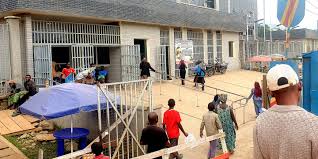A Daily Maverick investigation has uncovered a black market in fraudulent yellow fever vaccination certificates run by corrupt health officials and brokers operating at the Kasindi–Mpondwe border crossing — a critical trade and migration route between the Democratic Republic of Congo (DRC) and Uganda.
For as little as US$10 to US$20, travelers can purchase counterfeit vaccination cards that allow them to cross the border without receiving the actual vaccine — a scheme that endangers thousands and undermines regional disease control efforts.
Under World Health Organization (WHO) regulations, travelers crossing the DRC–Uganda border must present proof of yellow fever vaccination. But at Kasindi, a Daily Maverick team observed multiple instances where border health officers, in collusion with middlemen, sold official Ministry of Health documents without administering any vaccine.
Sources within the border facility said that the illicit trade has been ongoing “for years” but has expanded sharply in 2025 as stricter cross-border health checks were reinstated due to outbreaks in western Uganda.
“You just pay, and they stamp your card — no needle, no questions,” said one Congolese trader who crosses the border weekly to sell maize in Uganda. “Everyone knows it’s easier to buy the paper than to wait for the real shot.”
Investigators found that forged certificates bear official stamps from both Congolese and Ugandan health offices, suggesting collusion on both sides of the border. Some traders said they were even offered “express clearance” by officers for an additional fee.
The practice poses grave public health dangers. The World Health Organization has repeatedly warned that yellow fever — a mosquito-borne viral disease — remains endemic in both countries.
A fake certificate could allow an infected traveler to spread the disease across borders, potentially triggering outbreaks in densely populated trade towns.
Dr. Julien Kasereka, a public health specialist in Beni, said the scam “turns health security into a business transaction.”
“If vaccination cards are for sale, surveillance collapses. The entire purpose of the yellow fever certificate is to stop the virus from crossing borders,” he said.
When contacted for comment, Uganda’s Ministry of Health spokesperson, Emmanuel Ainebyoona, said the ministry was “aware of concerns at several border points” and had ordered an internal review.
“We have dispatched inspectors to Mpondwe to verify the authenticity of vaccination records issued there. Any health worker found complicit will face disciplinary and legal action,” he said.
The DRC’s North Kivu provincial health director, Dr. Jeanne Kavira, denied institutional involvement but admitted that “weak oversight and limited pay” have made some staff vulnerable to corruption.
“We are working with the national inspectorate and border authorities to tighten control and digitize vaccine records,” she added.
The Kasindi–Mpondwe crossing handles an estimated 35% of all goods traffic between eastern Congo and Uganda, including food, minerals, and fuel. The fraudulent vaccination racket, therefore, not only endangers health but also compromises trade integrity and regional trust under the East African Community (EAC) health protocols.
Officials from the World Health Organization (WHO) country office in Kinshasa confirmed they were “monitoring the situation” and had urged both governments to adopt electronic health certification systems to reduce manual tampering.
“The issue is not isolated,” a WHO field coordinator told Daily Maverick. “Similar fraud schemes have appeared in West Africa, but the danger is particularly high in areas with active disease circulation.”
Health corruption is just one piece of a wider ecosystem of illicit border practices. Truck drivers, small traders, and aid workers described paying “unofficial fees” for faster clearance, while others noted that security officers turn a blind eye to unvaccinated travelers if paid a small “service charge.”
Investigations also revealed that some counterfeit vaccination cards are printed in local cyber cafés in Kasindi town using high-resolution templates stolen from official offices. Several residents said police occasionally arrest low-level brokers but “never the real culprits.”
Civil society organizations and local health NGOs are calling for a joint DRC–Uganda task force to investigate and prosecute those behind the scheme.
The East African Health Research Commission (EAHRC) has also proposed that member states move toward digital vaccine verification systems linked to passport data — a reform stalled since 2023 due to lack of funding.
“This is not just a corruption issue — it’s a continental health threat,” said Rose Nakitende of the African Public Health Watch in Kampala. “If border corruption can sell immunity, then no one is safe.”
Despite repeated donor-funded initiatives to improve transparency at Kasindi, local watchdogs say oversight remains fragmented between customs, immigration, and health departments — creating loopholes easily exploited by corrupt officials.
As one Ugandan NGO leader put it:
“The problem isn’t the law; it’s enforcement. Until corrupt officers face real consequences, this health-for-sale market will keep thriving.”



